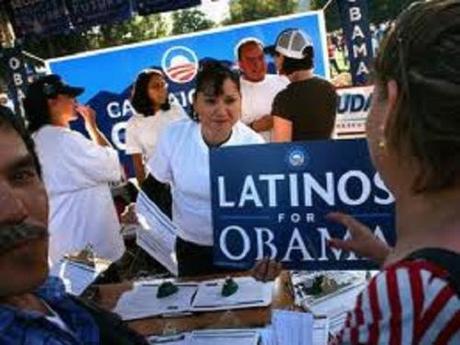Along with young people, Hispanics are also becoming disenchanted with President Lucifer.
Largely due to the disastrous rollout of his signature achievement, Obamacare, the POS’s approval ratings among Hispanics have plummeted from a post-election high of 75% in December 2012 to 52% in November 2013.
Call me cynical, but this means slightly more than half of all Hispanics in the United States still think the POS is just peachy-pie. Nor does the rising disapproval mean the majority of Hispanics will actually vote for non-Democrats in next year’s mid-term election or in the presidential elections of 2016.
Recall that in June 2012, 5 months before the presidential elections, the polls said support for the POS had dropped among blacks, Jews, and Hispanics, but he still won a majority of their votes on November 6.
~Eowyn

Marianela Toledo reports for Watchdog.org, December 17, 2013:
They were among President Obama’s best supporters, but support for the president and his signature health insurance scheme is quickly dying among Hispanics.
A recent Gallup poll showed Obama’s approval rating among Hispanic down 23%, to 52% in November from 75% in December 2012.
“Hispanics’ approval ratings of Obama have shown the most variation of any group’s ratings throughout his presidency,” the pollsters said when they released their report Dec. 5. “That means their views of him are less firmly anchored than those of other groups, which may help explain why their opinions of the president soured more than any other group’s in recent months.”
That’s not good news for the president, who is in desperate need of Hispanic support for the Affordable Care Act. A recent Kaiser Family Foundation report found that Hispanics account for 32 percent of the nation’s non-elderly uninsured population — just the group he needs to buy into Obamacare to make it a success.
So, why the sudden shift?
For starters, the Spanish language [Obamacare] website, cuidadodesalud.gov, isn’t finished. The pages where customers select a plan are still in English.
And that can cause big trouble for non-English speakers.
“If people are not selecting the right plan for themselves, depending on how they need or expect to use the insurance for the upcoming year, it might affect their financial bottom line,” said Luis Chaves of the Pangea Financial Group, who closely follows health care-related issues.
“For example, if I pick a plan that has a lower cost but I know that I have to have outpatient surgery, I might be better off selecting a plan that costs a little more per month but that has a co-payment for surgery of $300 instead of the plan that costs less but I have to pay the first $6,350,” Chaves said. “You always have to add up the monthly premium plus the amount of money you would have to pay for services you plan to use during the year.”
And then there’s a lack of general information, though the feds have held little back trying to promote the program.
“Hispanic people ask questions, and we all are a little confused,” said Chanel Valcarcel, a pharmacist at one of the many Narvarro Discount Pharmacy locations in Miami-Dade County. “Here, we try to explain what it is and refer (people) to the federal website. We are also working with private companies such as Blue Cross (Blue Shield) and health-care reform advisers.”
But even that’s not working for some people.
Health and Human Services Secretary Kathleen Sebilus has been to South Florida three times in three months, trying to drum up support, to little avail.
“I haven’t seen it. I don’t know about (the law),” Miamian Matias Garica told Florida Watchdog.
Miami resident Alina Lambert hasn’t seen it, either. “… But I heard from family and friends that it’s pretty bad. They have a hard time trying to use it, and it’s pretty expensive.”
But the feds aren’t giving up. The Obama administration has pledged a Hispanic-focused marketing blitz beginning in January and has pushed back until March the deadline for registering for an insurance plan.

